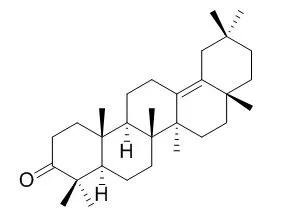| Description: |
δ-Amyrone(13(18)-Oleanen-3-one), a specific inhibitor of cyclooxygenase-2, possesses anti-inflammatory effects, which may be relevant to the regulation of COX-2; it exerts its protective effect on experimental gastric ulcer by inhibiting NF-κB signaling pathways, which subsequently reduces overproduction of the inducible enzymes iNOS and suppresses the release of the inflammatory factors TNF-α, IL-6 and NO. δ-Amyrone has protective activity on LPS-induced endotoxic shock, which is attributed to reducing NO production and mediating the pro-inflammatory cytokines, inhibited NF-κB expression. |
| In vivo: |
| Int Immunopharmacol. 2014 Jul;21(1):112-8. | | δ-Amyrone, a specific inhibitor of cyclooxygenase-2, exhibits anti-inflammatory effects in vitro and in vivo of mice.[Pubmed: 24813716] | The whole plant of Sedum lineare Thunb has been used as traditional folk medicines for the treatment of sore throat, persistent hepatitis, jaundice and dysentery.
METHODS AND RESULTS:
δ-Amyrone (13(18)-Oleanen-3-one), a pentacyclic triterpene compound from S. lineare Thunb, was found to possess a potent anti-inflammatory effect in different inflammation model animals. Pretreatment with 13(18)-Oleanen-3-one (i.p.) inhibited the ear edema in xylene-induced mouse ear edema. 13(18)-Oleanen-3-one also decreased the level of nitric oxide (NO), prostaglandin E2 (PGE2), interleukin-6 (IL-6) and leukocyte numbers in acetic acid-induced peritonitis in vivo. To clarify the possible mechanism of 13(18)-Oleanen-3-one, we investigated the effect of 13(18)-Oleanen-3-one in lipopolysaccharide (LPS) induced peritoneal macrophages. The data indicated that 13(18)-Oleanen-3-one notably inhibited IL-6, TNF-α and NO production. In addition, the result showed that 13(18)-Oleanen-3-one may control the cyclooxygenase-2 (COX-2) regulation and not the cyclooxygenase-1 (COX-1) at protein levels.
CONCLUSIONS:
These results suggest that 13(18)-Oleanen-3-one is a bioactive agent which possesses anti-inflammatory effects, which may be relevant to the regulation of COX-2. | | Immunobiology. 2015 Jun;220(6):798-806. | | Protective effect of δ-amyrone against ethanol-induced gastric ulcer in mice.[Pubmed: 25572867 ] | The purpose of this study is to examine the protective effect of δ-amyrone(13(18)-Oleanen-3-one ) on ethanol-induced gastric ulcer in mice.
METHODS AND RESULTS:
The mice intragastric administration 75% (0.5 mL/100g) ethanol was pretreated with δ-amyrone (4 and 8 mg/kg) and cimetidine (100 mg/kg) or vehicles in different experimental groups for a continuous three-day, and animals were euthanized 3h after ethanol ingestion. The gastric lesions were significantly attenuated by δ-amyrone (4 and 8 mg/kg) as compared to the ulcer control group. Pre-treatment with δ-amyrone prevented the myeloperoxidase (MPO) activity, production of nitric oxide (NO) in serum, expression of inducible nitric oxide synthase (iNOS) and nuclear factor kappa B (NF-κB) p65 protein expression. Analysis of cytokines in gastric tissue and serum of ethanol-induced mice showed the levels of tumor necrosis factor-alpha (TNF-α) and interleukin-6 (IL-6) were decreased by δ-amyrone in response to NF-κB p65.
CONCLUSIONS:
These results suggested that δ-amyrone exerts its protective effect on experimental gastric ulcer by inhibiting NF-κB signaling pathways, which subsequently reduces overproduction of the inducible enzymes iNOS and suppresses the release of the inflammatory factors TNF-α, IL-6 and NO. Thus, δ-amyrone shows promise as a therapeutic agent in experimental gastric ulcer. |
|






 Cell. 2018 Jan 11;172(1-2):249-261.e12. doi: 10.1016/j.cell.2017.12.019.IF=36.216(2019)
Cell. 2018 Jan 11;172(1-2):249-261.e12. doi: 10.1016/j.cell.2017.12.019.IF=36.216(2019) Cell Metab. 2020 Mar 3;31(3):534-548.e5. doi: 10.1016/j.cmet.2020.01.002.IF=22.415(2019)
Cell Metab. 2020 Mar 3;31(3):534-548.e5. doi: 10.1016/j.cmet.2020.01.002.IF=22.415(2019) Mol Cell. 2017 Nov 16;68(4):673-685.e6. doi: 10.1016/j.molcel.2017.10.022.IF=14.548(2019)
Mol Cell. 2017 Nov 16;68(4):673-685.e6. doi: 10.1016/j.molcel.2017.10.022.IF=14.548(2019)